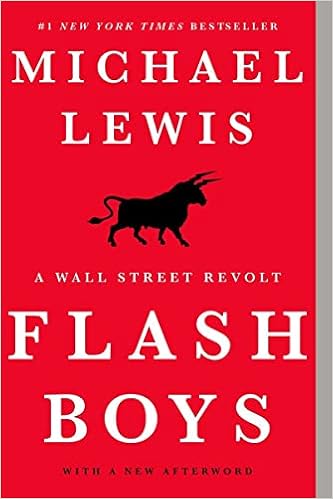
Description
"Lewis, as always, is exceedingly good at describing the complexities and absurdities of the subculture he portrays here… A deeply entertaining book, and one that illuminates how much our world has changed in less than a decade." ― Hector Tobar, Los Angeles Times "Important to public debate about Wall Street… in exposing what one of his central characters calls the ‘Pandora’s box of ridiculousness’ that financial exchanges have become." ― Philip Delves Broughton, Wall Street Journal "Reads like a thriller . . . Lewis is the kind of writer who creates his own weather system." ― John Lanchester, London Review of Books "Remarkable… Michael Lewis has a spellbinding talent for finding emotional dramas in complex, highly technical subjects." ― Financial Times "Michael Lewis does it again . . . fascinating." ― Steven Pearlstein, Washington Post "A beautiful narrative, so well-written. You’ve got to get this." ― Jon Stewart, The Daily Show "If you read one business book this year, make it Flash Boys ." ― David Sirota, Salon "Michael Lewis is a genius, and his book will give high-frequency trading a much-needed turn under the microscope." ― Kevin Roose, New York Magazine "Michael Lewis knows how to tell a story." ― Vanity Fair "A fast-paced tale backed by gutsy reporting." ― Tina Jordan, Entertainment Weekly "Who knew high-frequency trading was such a sexy subject?" ― Bloomberg Business Week "Score one for the humans! Critics of high speed, computer-driven trading have a new champion." ― CNN Money " Flash Boys richly deserves to be the first chapter in a new discussion of market rules and abuses… Lewis raises troubling and necessary questions." ― The American Conservative "Michael Lewis is one of the premier chroniclers of our age." ― Huffington Post "When it comes to narrative skill, a reporter’s curiosity and an uncanny instinct for the pulse of the zeitgeist, Lewis is a triple threat." ― James B. Stewart, New York Times "[Lewis] is a top-flight storyteller." ― Lev Grossman, Time "A tour de force that will grab and hold your attention like the best of thrillers." ― Jon Talton, Seattle Times "Lewis writes about the resilience of underdogs, even in the face of seemingly overwhelming odds. He’s doing essential work, and anything that embarrasses fat cats and encourages reform is a flash in the right direction." ― Julie Hinds, Detroit Free Press "Lewis simply tells the truth." ― Will Deener, Dallas News "Michael Lewis has another hit on his hands." ― Zachary Warmbrodt and Dave Clarke, Politico "[Lewis’s] ability to find compelling characters and tell a great story through their eyes is unparalleled. He can untangle complex subjects like few others. His prose sparkles." ― Joe Nocera, New York Times "As always, Lewis simplifies the complex―and makes it fascinating." ― People "Recommended… Entertaining." ― San Francisco Chronicle "Entirely engaging… Illuminates a part of Wall Street that has generally done business in the shadows." ― New York Review of Books Michael Lewis is the best-selling author of Liar’s Poker , Moneyball , The Blind Side , The Big Short , The Undoing Project , and The Fifth Risk . He lives in Berkeley, California, with his family.
Features & Highlights
- #1
- New York Times
- Bestseller ― With a new Afterword
- "Guaranteed to make blood boil." ―Janet Maslin,
- New York Times
- In Michael Lewis's game-changing bestseller, a small group of Wall Street iconoclasts realize that the U.S. stock market has been rigged for the benefit of insiders. They band together―some of them walking away from seven-figure salaries―to investigate, expose, and reform the insidious new ways that Wall Street generates profits. If you have any contact with the market, even a retirement account, this story is happening to you.



